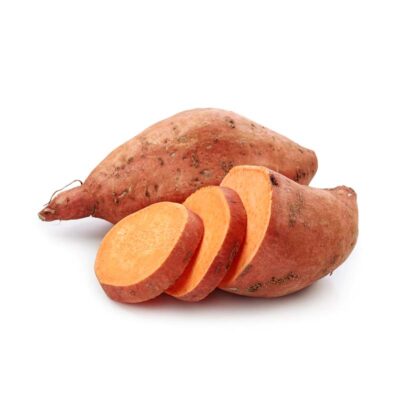Is Sweet Potato Good for Diabetes? Plus 4 Fantastic Benefits
Eating sweet potatoes offers many health benefits, including reducing blood sugar spikes. You might be wondering – how will this food benefit my diabetes diet? We explain if sweet potato is good for managing diabetes and provide 4 amazing benefits of eating it.

Eating the right food can prevent those blood sugar spikes.
Some people might fear starchy root vegetables when managing their diabetes symptoms. This is because starch-based foods often have a high glycemic index.
One good vegetable to try is sweet potato, as it contains lots of nutrients that will benefit your health. Minerals like calcium, magnesium, and vitamin C all contribute to the reduction of blood glucose levels. Just because it contains starch doesn’t mean it’s bad food for your diet.
Are you wondering if sweet potatoes can help people with diabetes?
Just keep on reading to find out more about this root vegetable.
Is Sweet Potato Good for Diabetes?
Yes, sweet potatoes can help people with diabetes, but only in moderate amounts. There are also lots of sweet potato varieties that can be better for diabetes. For example, to lower your blood sugar levels quickly, opt for the purple sweet potato instead of orange.
One serving of sweet potatoes won’t raise blood sugar, as they contain fiber that slows down the digestion process. Dietary fiber is very important for adding bulk to your stool and decreasing the absorption of sugar. Just remember to limit your servings to avoid eating too many carbs.
Magnesium is one mineral that can reduce diabetes symptoms. A 100g serving of sweet potato contains 25mg of magnesium. This might not seem like a lot, but it still contributes to your daily intake. Also, magnesium is great for weight loss and can regulate your glycemic response.
Low magnesium levels in your body often raise blood sugar and blood pressure. You need this mineral to strengthen insulin sensitivity; otherwise, your body can’t maintain blood glucose control. Eating a sweet potato is just one way to reduce the horrible effects of diabetes.
What Is Sweet Potato?
Sweet potato (sometimes called yams) is a root vegetable that comes in a variety of colors. They contain high amounts of vitamins, minerals, and antioxidants that benefit your health. You can boil sweet potatoes or roast them to enhance the sweet taste.
Many benefits derive from consuming sweet potatoes. Depending on your dietary preferences, this starchy root vegetable can be bought in orange and purple varieties. Purple sweet potatoes usually hold more anthocyanins compared to the orange versions.
Anthocyanins are water-soluble pigments that possess anti-inflammatory properties. People eat a range of sweet potatoes to reduce symptoms of inflammatory diseases. Since sweet potato is technically a root, it retains more healthy gut bacteria that clean out infectious toxins.
Sweet Potato Nutritional Value
Sweet potatoes contain a variety of nutrients, depending on how you cook them. For example, boiled sweet potatoes might have fewer minerals due to the hot water. Just be aware of this when cooking sweet potatoes, as the nutrients are important for stabilizing blood sugar.
Here is the nutritional value of sweet potato per 100 grams:

Different Varieties of Sweet Potato
There are a few common types of sweet potatoes. Each sweet potato contains different nutrients that contribute to a low glycemic index. If you regularly experience high blood sugar levels, it’s important you check the nutritional worth of each sweet potato before eating it.
Orange sweet potatoes are the most common. You’ll most likely find this one in grocery stores, as they can be the easiest to grow. Even though the orange versions are still healthy, they usually contain a high amount of carbohydrates that can disrupt diabetes management.
Purple sweet potatoes can be another great option for your meals. This type of potato can reduce blood sugar within 2 hours of consuming it. The anthocyanins also improve insulin resistance by protecting your cells and helping them respond to insulin production.
Lastly, there are Japanese sweet potatoes that appear purple on the outside but have a yellow interior. These sweet potatoes aren’t well-known but hold more magnesium, potassium, and calcium. You need plenty of these nutrients to regulate your blood sugar levels.
Who Should Not Eat Sweet Potatoes?
Even though sweet potatoes offer many health benefits, they don’t suit everyone. Certain health conditions might stop you from consuming this food. If you want other alternatives to sweet potato, try roasting carrots, pumpkins, parsnips, butternut squash, or celery roots.
People with kidney or gallbladder problems should avoid sweet potatoes. The high oxalate content can lead to stones that crystallize in urine. Oxalate isn’t always a dangerous substance, but you shouldn’t consume sweet potatoes when you’re at a higher risk of kidney stones.
Those who suffer from a sensitive stomach should also stay away from this root vegetable. Sweet potatoes contain mannitol – a type of sugar alcohol that can trigger severe constipation, nausea, and bloating. This also applies to people with chronic, long-term bowel diseases.
4 Benefits of Sweet Potato for Diabetes
Sweet potatoes have many benefits that improve your overall health. There are plenty of vitamins and minerals that help people with diabetes control their blood glucose levels. Just remember not to eat too much of this vegetable and limit your daily carb intake.
Let’s take a look at the 4 benefits of sweet potatoes:
#1 Good for eye health
Orange sweet potatoes contain beta-carotene – a pigment that can slow down macular degeneration. The body converts this pigment into vitamin A, which naturally supports strong eye health. Vitamin A is also great for reducing the risk of long-term eye infections.
Sweet potatoes especially have lots of vitamin C. This type of antioxidant forms collagen to provide structure to your eyes. Older adults usually need more of these vitamins to stop age-related cataracts – a cloud that forms over your lens due to the lack of protein.
#2 Regulates blood sugar levels
Depending on how you cook sweet potatoes, they can help regulate blood sugar. Baked sweet potatoes might have a higher glycemic index, so it’s important you boil them instead. This means they won’t lose any resistant starch that manages blood glucose concentrations.
Lower sugar in your bloodstream can also prevent heart disease. Too much glucose may damage blood vessels and nerves that control your heart’s natural functions. However, due to the nutrients in sweet potato, you won’t experience high levels of sugar after meals.
#3 Treats stomach ulcers
Sweet potatoes contain high amounts of B vitamins, calcium, and potassium. These nutrients are great for treating stomach ulcers. The B-complex vitamins especially shrink these painful ulcers and reduce symptoms like stomach pain, bloating, acid reflux, and frequent heartburn.
Just remember that consuming sweet potatoes alone won’t directly treat this problem. You need to speak to a doctor and cure the ulcers with proper medication. The rich source of nutrients will only minimize any side effects and possibly stop the stomach ulcers from getting worse.
#4 Possible weight loss
Many people know that sweet potatoes are much better for weight loss than white potatoes (or just regular potatoes). This is because they contain more nutrients that contribute to a fast metabolism. A stronger metabolism means your body burns through those unwanted calories.
Sweet potatoes also have fewer calories and high-fiber content. The more fiber you eat, the more likely you won’t crave junk food in between meals. This can stop you from binge eating in the future and increase the risk of heart disease and poor weight management.
Even having one small serving of sweet potato a day can boost your results. B vitamins, calcium, and magnesium can support weight loss and provide noticeable long-term results. For example, calcium increases thermogenesis, which naturally boosts metabolism.
FAQs
Yes, people with type 2 diabetes can eat sweet potatoes on a daily basis, but they must be mindful of the carb content. Consuming too much of this food may result in weight gain or blood sugar spikes. Simply eat less sweet potatoes and try to get your nutrients from other low-calorie vegetables.
You can eat half of a sweet potato with one main meal during the day. This should be enough to fuel your body with important nutrients. Always be aware of the high-carb content, as this might exceed the daily calorie intake or encourage more sugar to enter your bloodstream.
The way you cook sweet potatoes can change the glycemic index. For example, roasting this vegetable can destroy resistant starch, leading to a higher GI. Boiling sweet potatoes alters the chemical structure by helping enzymes properly break down the starch-based fibers.
A Word From Our Nutritionist
Sweet potatoes can be good for people with type 2 diabetes, but it’s very important that you don’t eat too much of them. The high-carb content could increase sugar in your bloodstream after meals. Always eat one serving per day and get minerals from other nutrient-dense foods.
You can still add sweet potatoes into your daily meals, as they have lots of healthy fats that fuel the body. Even magnesium, calcium, and beta-carotene contribute to a stronger metabolism, which may help you lose weight without disrupting blood glucose production.
Speak to a healthcare provider if you have severe type 2 diabetes symptoms. Eating a sweet potato won’t cure those unwanted side effects. If you have heart disease or any other health issues, gain professional advice from a dietitian who knows what food might be best.
Conclusion
So, are sweet potatoes good for managing diabetes?
Sweet potatoes have lots of important nutrients that benefit your overall health. You can eat one small serving to regulate blood sugars throughout the day. Just be aware of the carbohydrates when eating this root vegetable, as they could trigger hyperglycemia symptoms.

















































 Select your language:
Select your language: 








